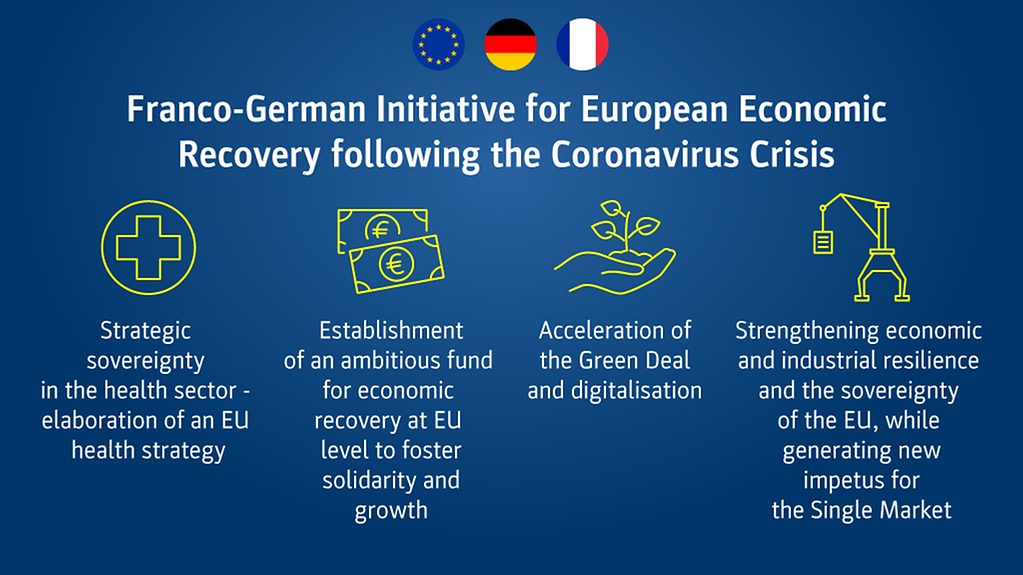FAQs on the Franco-German initiative
The COVID-19 pandemic is an unprecedented challenge for Europe. Germany and France have made a proposal for Europe’s economic recovery. The European Commission presented its economic recovery plan on 27 May. It contains elements of the Franco-German proposal.
4 min reading time

The aim is to ensure that Europe can emerge from the crisis unified and in a spirit of solidarity
Photo: Bundesregierung
The aim of the initiative proposed by Germany and France for European economic recovery is to "weather the economic consequences of the pandemic and perhaps come out of it stronger than before". To this end they propose an "unprecedented one-off effort" as Chancellor Angela Merkel said at a joint press conference with President Emmanuel Macron. One key component of the initiative is the establishment of a Recovery Fund.
Why do we need a Recovery Fund?
The economic and social impacts of the pandemic can be felt in all member states, with some regions and sectors particularly hard hit. The Fund follows the basic philosophy that underpins the cohesion policy the EU has practiced for many years: reducing economic and social imbalances to enable the European economy to grow together more effectively.
The Franco-German initiative applies this principle to the consequences of the coronavirus crisis. Since the economic consequences vary from one member state to another, the pandemic could be a threat to cohesion within the EU. Germany and France would like to see Europe stand together and "to come out of this crisis together in an even greater spirit of solidarity," said Chancellor Angela Merkel.
How much will the Fund be worth and what is its goal?
Germany and France propose establishing an effective, targeted Recovery Fund worth 500 billion euros, that would operate for a limited period. In addition to national efforts, the EU is thus to be enabled provide support for the worst hit sectors and regions.
Along with the Multiannual Financial Framework (MFR 2021-2027) the Fund is to define the entire EU budget. It is to enhance resilience, convergence and the competitiveness of the European economy, increase investment especially in digital and environmental transformation, and strengthen research and innovation.
Member states would authorise the European Commission to raise the additional funds "on the market; these will be spent in the short term but repaid over a longer period," explained the Chancellor. Contributions would be in line with the usual key for member states’ contributions, said Angela Merkel.
Would the Fund provide grants or loans?
The Fund is to enable the EU to provide the member states worst hit by the pandemic with funds within the framework of its own budget – in the form of grants, not loans.
"The exceptional nature of this crisis is causing us to choose an exceptional way forward, because that is necessary in order to find a response to this unprecedented crisis,", explained the Chancellor. What is needed is a "swift recovery" – so it is "not only justified but also necessary that the European side now provide funding".
In addition, the Chancellor stressed that the Fund can also be used to invest "in digitalisation, in the Green Deal, and in addressing the climate crisis" – in other words to invest in the "future viability of the European Union".
Is the money to be available for an unlimited period, and what is to be financed?
The Recovery Fund is not to be a permanent instrument, but is only to be used for a limited period of time. It is designed to finance specific measures to overcome the consequences of the coronavirus pandemic, which was not within the control of individual member states.
These measures are part of the joint policies and programmes for which the EU is responsible and will be financed from the EU budget. The funds will not be used to finance general state spending.
What type of liability is planned?
No joint liability is planned. Member states will provide the Commission with a one-off authorisation to raise a specific sum on the market on behalf of the EU and using the EU budget as collateral.
Will the German Bundestag be involved?
Chancellor Angela Merkel stressed that a Recovery Fund too must "naturally comply with the European Treaties and European budgetary law". The budget planning of member states will also be affected. The Recovery Fund must be put "on a secure legal footing" and "also reflect the budgetary autonomy of the various national parliaments," said Angela Merkel.
The basis will thus be an exemption clause, anchored in the Own Resources Decision and linked to a mandatory repayment plan. The provisions of the Own Resources Decision must be adopted unanimously and then ratified by national parliaments, in Germany by the German Bundestag.
Where do we go from here?
The European Commission has the right of initiative. The next step is thus the proposal of the European Commission, which it presented on 27 May – the Next Generation EU. The recovery plan, which is worth 750 billion euros, is to be embedded in the reworked EU budget. 500 billion euros are to be provided to particularly hard hit member states as grants and 250 billion euros as loans.
This proposal will be discussed at the next meeting of the European Council on 18 and 19 June. The aim is to achieve an agreement by autumn so that the programme can come into effect on 1 January 2021 having been approved by the European Parliament and the national parliaments of member states.